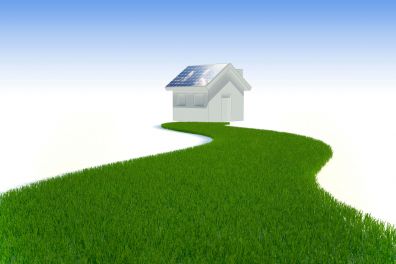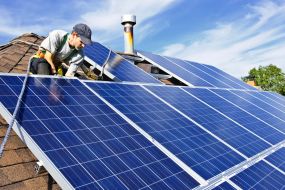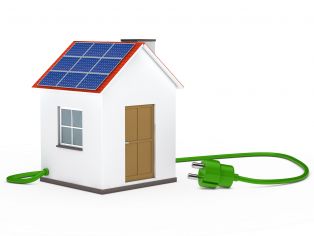Is Solar Energy Renewable or Nonrenewable New Jersey
Is Solar Energy Renewable or Nonrenewable?
Solar energy is renewable because the sun will always be shining. However, it’s also possible to use wind or water as a source of renewable energy. Non-renewable sources of energy are usually more difficult to sustain and cannot be regenerated after they have been used. For example, fossil fuels such as coal and oil are non-renewable sources of energy.
The world’s energy needs constantly increase, and many believe that fossil fuels will eventually run out. Fortunately, there is a renewable resource that can produce clean energy without damaging the environment: Solar energy.
Solar energy works by collecting sunlight and turning it into electricity with photovoltaic cells. Photovoltaic cells are made of semiconductors like silicon which create an electrical charge when exposed to light. This article covers how solar energy works, the many benefits of using solar energy, and what you should know before making a switch to a greener lifestyle.
What is solar energy?
Solar energy is a form of clean, renewable energy that comes from the sun. Solar panels gather solar energy and use it to produce electricity. The solar panels can be used to power homes and businesses and provide hot water for homes.
The main reason people choose to convert their homes or businesses to solar energy is that it’s clean. Solar energy doesn’t produce greenhouse gasses, so using it has less of an impact on the environment than other sources of electricity.
Converting your home or business to solar energy will save you money in the long run. You can use the money you save on monthly utility bills to invest in other areas of your home or business. In addition, you can qualify for tax credits and rebates when using solar energy!
How does solar energy work
A solar panel generates electricity by converting sunlight into energy. Solar panels are typically made of silicon, absorbing the sun’s energy and transferring it to electrons that flow through metal. The electrons then go to an electric grid or battery, which stores that energy for future use.
Solar energy is very similar to conventional electricity, and it provides the same benefits. Solar energy can be used in many different ways:
Powering homes and business
Solar rooftops allow businesses and homeowners to generate their energy. The solar panels take in sunlight and convert it to power, which reduces the amount of electricity you have to purchase from a utility company.

Heating water for homes and businesses
Solar water heaters use the sun’s energy to heat water and store it in a tank for later use. Water is circulated through panels on the roof, where it absorbs heat and then goes into a storage unit. An electric pump moves the heated water through your home or business, just like a hydrothermal system.
Electrical use
Solar energy can also be used to power appliances in your home or business. Electricity from the sun is stored in a battery and then distributed throughout your building with the use of inverters, where it powers anything that needs electricity. This includes appliances, televisions, lights, computers – basically any electrical device you have!
Providing outdoor lighting for homes and properties
Solar lights are used to illuminate landscapes and paths for outdoor use. Solar lights work by converting the sun’s energy into electricity, which powers LED bulbs that provide light at night.
Generating emergency power during blackouts
Several products can be powered using solar energy, including lanterns and radios. This allows you to maintain your routine and remain informed during a power outage.

Providing off-grid power for camping, emergencies, and recreational vehicles (RVs)
Having the ability to generate your power allows you to enjoy outdoor activities without worrying about having access to modern conveniences. Campers use solar energy products like lanterns, fans, phones chargers, and portable stoves.
One of the main reasons people choose to use solar energy in their homes and businesses is because it’s a clean, renewable solar energy resource.
Types of solar energy renewable sources
Solar energy is one of many renewable sources of energy. There are several types of renewable energy, including the following:
Solar energy (Sunlight)
Solar energy is the sun’s rays that are directly absorbed by objects. The heat and light can be converted into electricity or heating water for homes. For example, solar panels on rooftops absorb sunlight to create electricity that can then power electric appliances inside the house.
Wind energy /Turbine
Wind energy is created by the flow of air from high-pressure areas to low-pressure areas. This force can be used to power turbines, which turn and produce electricity.
Hydropower (Water)
Dams use water pressure to turn on turbines and generate electricity. During periods of low electricity demand, dams release extra water, which can pass through the turbines and generate power.
Biomass energy (Plants)
Burning organic materials such as wood, animal dung, and other plants creates heat and electricity. Many farmers use this type of energy on a small scale to power their homes or irrigation pumps.
Geothermal energy (Earth’s inner heat)
This type of energy is created by the natural heat found within the Earth’s crust. This heat can be used to generate electricity or provide heating for homes via geothermal heating systems.
Tidal Energy
The flow and ebb of tides are affected by gravitational forces between Earth, the sun, and the moon. Tidal energy converts this natural movement into electricity.
Renewable sources of energy are essential because they decrease the amount of pollution. They also provide more sustainable forms of energy, significantly as fossil fuels such as oil, coal, and natural gas are being depleted.
The advantages of solar energy
In addition to being better for the environment than fossil fuels, other benefits come from switching to solar energy:
- Solar energy is a form of “green energy” and is considered a renewable resource.
- There are no harmful emissions when using solar energy, so it doesn’t contribute to air pollution or climate change.
- Solar energy can reduce the use of fossil fuels and help preserve natural resources.
- The cost of using solar panels has decreased significantly in recent years, making it more affordable for people to convert their homes and businesses to solar energy.
What you should know before using solar energy
There are several things you need to consider before switching your home or business over to solar energy:

- The amount of sun exposure available at your property will determine how many panels you’ll need for your converter box and how much time it will take to produce enough energy.
- The cost of a converter box can vary, depending on its size and how many panels are included.
- You’ll need to save up the initial cost of converting to solar energy over time.
If you choose to switch your home or business to solar energy, you’ll be doing something great for the environment and saving money in the long run.
Frequently asked questions
Q: What is renewable energy?
A: Renewable energy is any form of energy that can be replaced without being depleted. Examples are wind, solar, biomass, geothermal, and water power.
Q: What is the difference between renewable and nonrenewable?
A: Solar energy is a renewable energy source because it cannot run out and has no harmful emissions. Fossil fuels are nonrenewable sources of energy because they can run out and emit harmful emissions.
Q: What are the benefits of solar energy?
A: Some benefits to using solar energy include that it produces no harmful emissions, reduces fossil fuel use, contributes less to climate change, does not require building new power plants, and is considered a renewable resource.
Q: What are some disadvantages to using solar energy?
A: Some disadvantages of using solar panels include the initial cost of purchasing and installing them, limited access due to where you live or store your home or business, and time for the system to produce energy.
Q: What is the cost of converting to solar energy?
A: The cost of converting to solar energy will vary depending on the size and number of panels in your converter box, as well as where you live. You might need to budget for initial costs include installation and equipment such as converters, wiring, plumbing, insulation, and roof repairs.
Q: What should I know before converting to solar energy?
A: When converting to solar energy, you’ll need to consider things such as how much sun exposure is available at your property, what the initial cost of a converter box will be, and whether you have enough time for the system to produce a good amount of electricity. You’ll also need to save up the initial cost of converting to solar energy over time.
